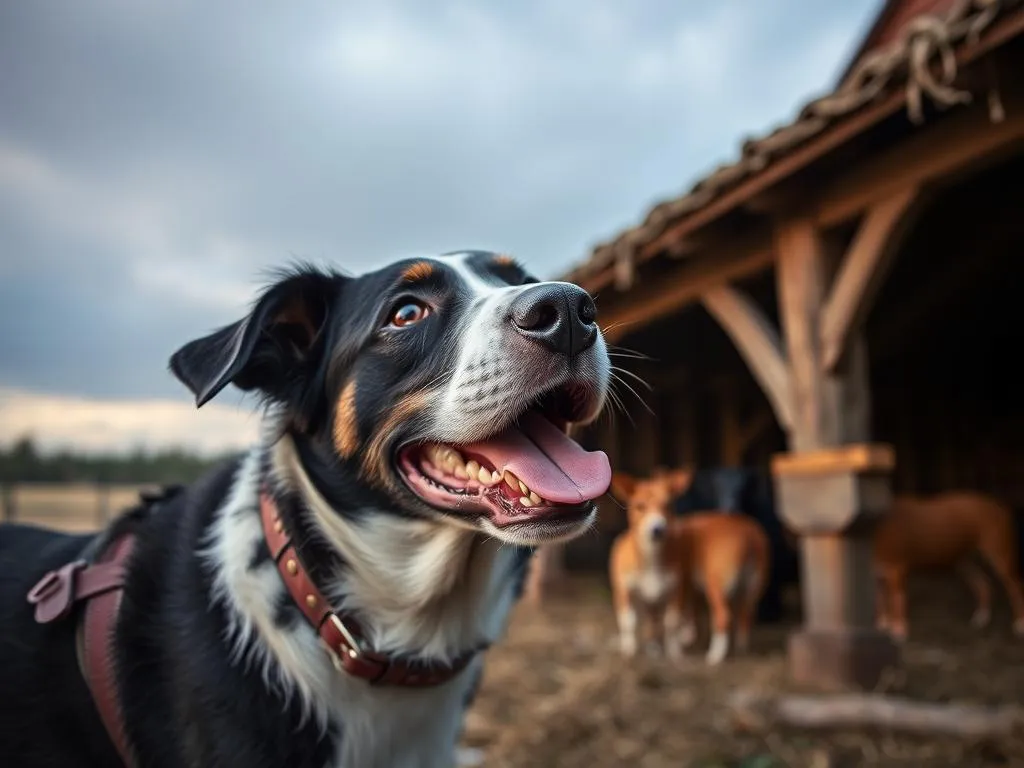
Introduction
Barn Hunt is an exciting, engaging sport that allows dogs to showcase their natural instincts and abilities in a controlled environment. This unique canine activity combines elements of scent work, agility, and problem-solving, providing both physical and mental stimulation for dogs. Originating in the United States, Barn Hunt was developed to challenge dogs to find and indicate the location of hidden rats in a barn-like setting. While the original intent was to utilize dogs for pest control, the sport has evolved into a beloved pastime for dog owners and trainers alike.
In the realm of dog sports, Barn Hunt holds a special place due to its inclusive nature and the variety of breeds that can participate. As a relatively new sport, it has gained popularity in recent years, attracting a diverse community of dog enthusiasts. Whether you are a seasoned dog sport competitor or a casual dog owner, Barn Hunt offers an opportunity for fun and bonding with your canine companion.
In this comprehensive guide, we will delve into the world of Barn Hunt, exploring its history, rules, training methods, benefits, competitions, and common challenges faced by participants. By the end of this article, you’ll have a clear understanding of what Barn Hunt is for dogs, and how you can get involved.
Understanding Barn Hunt
What is Barn Hunt?
Barn Hunt is a sport that allows dogs to demonstrate their hunting instincts by locating and indicating the presence of a rat, which is safely contained in a tube. The setup typically simulates a barn environment, featuring obstacles like hay bales and tunnels for dogs to navigate. During a typical Barn Hunt trial, dogs are timed as they search for the hidden rat, showcasing their ability to use their sense of smell and problem-solving skills.
Handlers play a crucial role in guiding their dogs through the course. Dogs must learn to work with their handlers, indicating the location of the rat by sitting, standing, or pawing at the tube. The sport is designed to be fun and engaging, providing dogs with the opportunity to use their natural instincts in a safe and controlled manner.
History of Barn Hunt
The origins of Barn Hunt can be traced back to the need for effective pest control in barns and farms. As farmers sought ways to manage rodent populations, they turned to dogs, who have been hunting companions for centuries. The sport began to take shape in the early 2000s, when dog enthusiasts recognized the potential for a structured competition that would allow dogs to showcase their hunting abilities in a safe environment.
Since its inception, Barn Hunt has evolved significantly. It has grown into a formalized sport with established rules and regulations, attracting a wide array of participants. The inclusion of various breeds, from terriers to hounds, has made it a beloved activity for dog lovers everywhere.
Key Components of Barn Hunt
The typical Barn Hunt setup includes several key components that create a stimulating environment for both dogs and handlers:
- Barn Environment: The arena is designed to replicate a barn, complete with hay bales and tunnels for dogs to explore.
- Hidden Rats: A rat is safely contained in a tube, and dogs must use their keen sense of smell to locate it.
- Obstacles: Hay bales and tunnels provide challenges that dogs must navigate to reach the target.
- Handler Role: Handlers guide their dogs through the course, helping them understand the task at hand.
These elements come together to create an exciting and rewarding experience for both dogs and their handlers.
The Rules of Barn Hunt
Basic Rules
Participating in Barn Hunt comes with a set of fundamental rules designed to ensure fair play and safety for all involved. Each trial consists of a designated course, which dogs must complete within a specific time frame. Points are awarded for various accomplishments, such as locating the rat and successfully navigating obstacles.
Handlers must remain with their dogs at all times, providing guidance while allowing their dogs to take the lead in the search. The scoring system typically includes points for indications (finding the rat), completing the tunnel, and successfully navigating the hay bales.
Equipment Required
To participate in Barn Hunt, certain equipment is essential:
- Hay Bales: Used to create obstacles and hiding spots for the rat.
- Tunnels: Provide an additional challenge that dogs must navigate.
- Rat Tubes: Safe containers for the live rats used in the sport.
- Leashes and Collars: Essential for controlling your dog during the event.
Safety gear, such as appropriate collars and harnesses, is also recommended to ensure both dogs and handlers are protected during competitions.
Safety Guidelines
Ensuring the safety of dogs and participants is paramount in Barn Hunt. Here are some safety guidelines to follow:
- Health Check: Ensure your dog is healthy and up to date on vaccinations before participating in events.
- Supervision: Always supervise your dog during training and competitions.
- Hydration: Provide plenty of water for your dog, especially during hot weather.
- Rest Periods: Allow your dog to rest between runs to prevent exhaustion.
By adhering to these guidelines, participants can enjoy the benefits of Barn Hunt while prioritizing the well-being of their dogs.
Training for Barn Hunt
Getting Started with Barn Hunt
Introducing your dog to Barn Hunt can be an exciting journey. The initial steps involve familiarizing your dog with the environment and the concept of scent work. Start with short training sessions, using positive reinforcement to encourage your dog to explore the obstacles and search for the rat.
Considerations such as your dog’s age and breed are important. While many breeds can excel at Barn Hunt, terriers are particularly known for their strong prey drive and natural hunting instincts. However, dogs of all ages and breeds can participate with the right training and encouragement.
Training Techniques
Effective training techniques play a crucial role in preparing dogs for Barn Hunt trials. Here are some methods to consider:
- Scent Work Training: Begin with basic scent discrimination exercises, allowing your dog to identify and locate different scents.
- Agility Training: Incorporate agility exercises to help your dog navigate obstacles with confidence.
- Practice Indications: Encourage your dog to indicate the location of the rat by rewarding them when they show interest in the tube.
Consistency and patience are key when training your dog for Barn Hunt. Celebrate small victories and gradually increase the complexity of the tasks as your dog becomes more proficient.
Finding Trainers and Classes
Locating reputable trainers and classes is essential for anyone looking to get serious about Barn Hunt. Start by checking local dog training facilities, as many offer specialized classes focused on Barn Hunt. Joining Barn Hunt clubs is also a great way to connect with experienced handlers and trainers who can provide guidance and support.
Participating in group classes not only enhances your dog’s skills but also fosters community engagement among dog owners. Building relationships with fellow enthusiasts can provide invaluable insights and encouragement as you embark on your Barn Hunt journey.
Benefits of Barn Hunt for Dogs
Physical Benefits
One of the most significant advantages of Barn Hunt is the improvement in physical health and fitness for dogs. The sport encourages dogs to engage in physical activity, promoting cardiovascular health and muscle tone. Running through tunnels, jumping over obstacles, and navigating hay bales are excellent forms of exercise that keep dogs active and healthy.
Mental Benefits
In addition to physical benefits, Barn Hunt provides essential mental stimulation for dogs. The sport encourages cognitive engagement, as dogs must problem-solve to locate the hidden rat. This mental exercise can lead to improved focus and behavioral control, making dogs more well-rounded companions.
Confidence building is another crucial aspect of the mental benefits of Barn Hunt. As dogs succeed in locating the rat and navigating obstacles, they gain confidence in their abilities, which can positively impact their behavior in other areas of life.
Social Benefits
Barn Hunt also offers valuable social opportunities for dogs and handlers. Participating in training classes and competitions allows dogs to interact with other dogs in a controlled environment, promoting positive socialization skills. Handlers can connect with fellow dog lovers, share experiences, and build a supportive community.
Engagement in local events and competitions further enhances community involvement. Many clubs organize social gatherings, providing opportunities for dog owners to connect, share tips, and celebrate their canine companions.
Competitions and Events
Overview of Barn Hunt Competitions
Barn Hunt competitions are structured events where dogs compete to locate hidden rats within a specified time limit. Trials typically consist of multiple runs, allowing dogs to showcase their skills at different levels. Competitions are divided into categories based on the dog’s experience level, ranging from novice to master.
Handlers are responsible for guiding their dogs through the course, and points are awarded based on performance. The atmosphere at Barn Hunt events is often lively and supportive, with participants cheering each other on.
Preparing for Competition
Preparing for Barn Hunt competitions involves several key considerations:
- Practice Runs: Regular practice sessions will help your dog become familiar with the course layout and improve their performance.
- Nutrition and Hydration: Ensure your dog is well-nourished and hydrated leading up to competition day.
- Mental Readiness: Engage in mental warm-up exercises to help your dog focus before their run.
Understanding what to expect at events can help alleviate anxiety for both dogs and handlers. Familiarize yourself with the competition rules and procedures to ensure a smooth experience on the day of the trial.
Major Barn Hunt Organizations
Several organizations govern Barn Hunt, setting standards and regulations for competitions. Among the most recognized is the Barn Hunt Association (BHA), which provides resources for participants and hosts official events. These organizations work to promote the sport, ensuring that it remains safe and accessible for all involved.
Joining an organization can provide valuable insights into upcoming events, training resources, and the latest news in the Barn Hunt community.
Common Challenges and Solutions
Behavioral Challenges
As with any dog sport, participants in Barn Hunt may encounter behavioral challenges during training. Common issues include distractions, anxiety, or lack of focus. Here are some strategies to overcome these challenges:
- Desensitization: Gradually expose your dog to the competition environment to help reduce anxiety.
- Positive Reinforcement: Use treats and praise to encourage desired behaviors and maintain focus during training.
- Short Training Sessions: Keep training sessions brief and engaging to prevent boredom and frustration.
Addressing behavioral challenges early on can help create a positive training experience for both dogs and handlers.
Physical Limitations
Older dogs or those with physical limitations may face unique challenges in Barn Hunt. Modifications to training and competition can ensure that all dogs can participate safely. Consider the following solutions:
- Tailored Training: Adjust training exercises to accommodate your dog’s physical abilities, focusing on their strengths.
- Alternative Activities: Explore other dog sports or activities that may be better suited for dogs with physical limitations.
By recognizing and addressing these challenges, all dogs can enjoy the benefits of Barn Hunt, regardless of their physical capabilities.
Conclusion
Barn Hunt is a captivating sport that provides dogs with the opportunity to utilize their natural instincts while promoting physical, mental, and social well-being. With its rich history and inclusive nature, this sport has captured the hearts of dog lovers everywhere.
By understanding the rules, training techniques, and benefits of Barn Hunt, you can embark on an exciting journey with your canine companion. Whether you are looking to compete or simply enjoy the process of training, Barn Hunt offers a rewarding experience for both dogs and their handlers. Consider exploring local events or classes to immerse yourself in this growing community and discover the joy of Barn Hunt for yourself and your furry friend.









